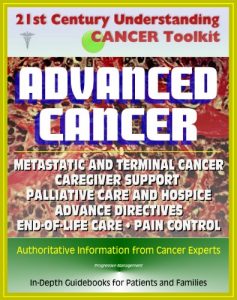This massive guide, with over 600 pages and 23 chapters, has authoritative information and practical advice from the nation's cancer experts about advanced cancer, with valuable information for patients, families, and caregivers about every aspect of metastatic disease. Conveniently organized contents include: Coping With Advanced Cancer; When Cancer Returns; When Someone You Love Has Advanced Cancer: Support for Caregivers; Cancer Staging; Understanding Prognosis and Cancer Statistics; Metastatic Cancer: Questions and Answers; Home Care for Cancer Patients; Palliative Care in Cancer; Hospice; How To Find Resources in Your Own Community If You Have Cancer; Advance Directives; End-of-Life Care: Questions and Answers; Adjustment to Cancer: Anxiety and Distress; Cognitive Disorders and Delirium; Communication in Cancer Care; Family Caregivers in Cancer: Roles and Challenges; Spirituality in Cancer Care; Pain Control: Support For People With Cancer; Pain; Transitional Care Planning; Last Days of Life; Grief, Bereavement, and Coping With Loss; Supplement - General Cancer Information And Resources. One of the guidebooks provides this advice to patients faced with advanced cancer: "You’ve struggled with the diagnosis, treatment, and maybe the recurrence of cancer. Now doctors may have told you that you have advanced cancer. They may have said that your cancer is not responding to treatment and that long-term remission is no longer likely. Or they may have said they have run out of standard treatment options. However you learn the news, it can be devastating to you and your loved ones. Often it’s hard to believe or accept at first. Having advanced cancer can bring anxiety and uncertainty to your life. But some people with advanced cancer live far longer than expected. And remember, you are still in control of your choices and actions. Having an advanced disease can be a time of personal growth. It can even be a time of second chances. Many people say they started to see life in a new way after learning that their cancer had progressed despite treatment. They realized the importance of making the most of each day. This guide stresses four main points: Learning more about ways you can help yourself may ease some of your concerns. Your treatment may change, but as always, you deserve to ask for and receive good medical attention from your health care team and support from your caregivers. It’s important to talk about your worries, frustrations, and problems, and get support from others. In fact, it may be one of the best things you can do for yourself. As your medical care changes, you still have many choices. You can choose the way you wish to live each day." * This is a privately authored news service and educational publication of Progressive Management. For over a quarter of a century, our news, educational, technical, scientific, and medical publications have made unique and valuable references accessible to all people. Our e-books put knowledge at your fingertips, and an expert in your pocket!
This site is safe
You are at a security, SSL-enabled, site. All our eBooks sources are constantly verified.






